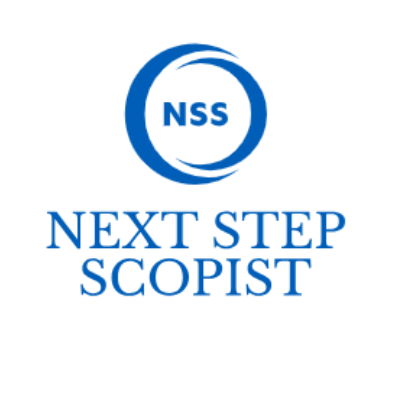May 11th – Things You Should Know Before Becoming A Scopist

There are a lot of things I love about being a scopist, and there are a lot of things I wish I had been more prepared for before I became a scopist. As I’ve already written posts explaining how you can become a scopist, I think it’s time to share what I have learned since becoming a scopist that I wish I had known before!

This may not be your only job in the beginning
There are a lot of things in the beginning of entering this field that I don’t think I fully understood. One of these is just how much time it actually takes to make a decent living from this job. Keep in mind that scopistry is not a “get rich quick” endeavor.
I do say, “This MAY not…” because it is simply a caution, not a universal truth. You may be one of the lucky ones who gets a reporter really quickly or is able to find consistent work quickly after you begin searching. However, this was not the case for me.
It takes time to gain a following, to gain a reputation, or to get your name out there. As I mentioned in a previous post, you’re more likely to secure work once reporters can verify your credibility. This means you need to spend time earning that credibility. You might get lucky and find a reporter who is willing to mentor you, or who is willing to take on a less experienced scopist. Be prepared that also, you may not.
For about a year at the beginning of my career, I was not earning enough money to support myself, and needed to supplement my income with other jobs. This is where I found transcription and proofreading. I took on those positions because I needed to remain in this field while I searched for scopist work. I ended up loving transcription and proofreading, and I continue to take those jobs today. However, the point is that I didn’t start them as my first career choice. I started them because it was a necessity.

There is no scopist certification
This was a pretty quick Google search, but it saves you from looking silly later on. There is no place you can go to get a certificate that qualifies you as a scopist. There is no test to take or ranking you must achieve within a certain organization in order to gain that certification. You can receive education and training, but you won’t find a certification.
This is true for the moment, but it may not be true in the future. According to the ISS, the NCRA is still working on a certification for scopists but it is not currently available.

There are no ‘off’ hours
This was a strange one for me because I felt like I knew about it but wasn’t truly prepared for what it meant.
I have rewritten this section three times because it’s so hard to put this experience into words.
Throughout your career, but especially in the beginning, it’s important to be prepared for anything. If you’re trying to find consistent work, you can’t expect to have the luxury of being picky. You might get a reporter whose writing isn’t great, you may get incredibly technical depositions requiring a lot of research, or you may get really fast turnaround times.
I found that I didn’t have the luxury of turning down difficult jobs. I worked on other people’s schedule for a very long time, because it was important to meet their standards and criteria to do quality work. It’s not unheard of to get a late-night email asking for help the following day. Or to find yourself working late into the night to finish an incredibly technical or difficult deposition due the following morning.
I often worked far, far too many hours. Between finishing work for the clients I had, while supplementing my income, and attempting to find work that wouldn’t burn me out, I was easily working 100 hours per week. Do you have to do that? No. But that’s what I did.

Social media is more important than you think it is
I covered this before, but it is worth noting a second time.
Producing quality transcripts and depositions is not enough to get you clients. Being amazing at what you do isn’t enough to get you clients. At least, not in the beginning. You need to market yourself, get yourself in front of the right people, and get noticed by those who require and desire your services. This is where social media comes in.
I received more exposure from Instagram than I received from LinkedIn and the Facebook groups combined. This is partly to do with the work I have done to get my name out there and get my information at the top of a Google search, but it was much more effective than scouring Facebook groups or trying to contact people via LinkedIn. I have received clients via this website, and I have had conversations with potential clients via Instagram, which is much more than I received from Facebook or LinkedIn.
Social media in 2024 is one of the greatest tools at your disposal. If you want to reach your target audience/clientele, you should be looking for them where they spend their time. A younger generation of court reporter is coming up, and they’re spending their off time on Instagram. When they’re trying to relax, passive scrolling through their Feed, if they come across a title they’re intrigued by or a picture they relate to, they’re going to click.
This is true of everyone. Think about how many times you or someone you know has bought something they saw an ad for on Instagram or Facebook when you weren’t even looking for it. Making a blog, or regularly posting on a social media account, and interacting with people from that account will get your name in front of the people who could actually use your services, and may be interested in hiring you. If you can create interesting, relevant, and productive content, you’ll get attention from the right people. This attention can lead to clientele.

The software you choose makes a difference
When you’re first starting out and you’re investing the money into buying one of the software programs, make sure to do your due diligence. This is not to say one is better or worse than any other, but reporters are using different kinds of software and will choose scopists who are working on that same software.
I found Case CATalyst to be the most popular one, and it’s the one I use. But there are others, such as StenoCAT and Eclipse. There are things to be mindful of for each software.
Case CATalyst is very popular among court reporters and scopists. But that means for each court reporter looking to hire a scopist, there are about 5 scopists looking to get the job. This makes it much more competitive and difficult to secure work. The other software programs are less competitive, but there are also fewer reporters using them, so you may not succeed in finding work right away. That being said, it’s not unheard of to be trained on and use more than one program. I cannot speak to this experience, however. Logically though, you have to expect this would be incredibly expensive in start-up and maintenance costs.
—-
This is far from a comprehensive list. I’m sure this will be one I come back to later down the line to update you on more things that I learn that would have been helpful earlier on. But for now, these are the things I think would have been the most helpful for me had I truly known and understood them before I embarked on this path. Even with this knowledge, I still would have followed this road. I may have just wandered it a little differently.
—-
I hope you enjoyed this week’s post. If you did, make sure to leave a comment down below and check back for a new post on the Next Step Scopist blog!
Last Post: May The Fourth Be With You – How To Beat Procrastination
Next Post: Productivity Creators To Follow In 2024

Leave a Reply